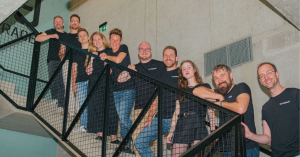When I first connected with Geri Kirilova, I was struck by her clarity of thought and deep understanding of early-stage investing.
As a Partner at Laconia Capital Group in New York, she is at the intersection of American capital and global opportunity. However, what makes her perspective unique is not just professional acumen. It is her ability to spot talent in unexpected places, and understand how it can scale internationally. Of course, if the founder knows how to play the capital game right…
At Laconia, Geri backs serious founders building must-have B2B software for mission-critical industries, with an “anti-chaos” investment strategy that brings systematic order and human partnership to an early-stage. Before joining in 2016, she cut her teeth at Techstars in New York, Credo Ventures in Prague, and Launchub Ventures in Sofia. Originally from Bulgaria and now based in Zurich, Geri is reconnecting with the European startup ecosystem while leveraging her NYC-honed experience to support founders solving global problems.
We met in person for the first time in Varna, during the Bridge — a gathering of builders and investors by the Black Sea. The conversations were on point and raw, the setting informal. No slides, no stage, just real stories. During the sessions, one question I raised kept surfacing up: how do you build momentum when no one’s watching yet?
I brought up the case of EnduroSat, the aerospace company that first announced a €20M round in February this year — and later revealed the total had grown to €43M by May. Was this a strategic leak? A layered raise? An orchestrated FOMO effect?
Getting that VC attention
Can FOMO really be engineered — or is it just a story we tell ourselves when things work out, I asked Geri right off the bat.
“Everything is just a story that we tell ourselves! Jokes aside — you probably can’t pull FOMO out of thin air, but you can build it by leveraging business momentum, a compelling narrative, and a solid process,” Geri explains.
Fundraising is unlike traditional B2B sales, she adds: “there is no inherent latent market demand for your round, and you can’t convince someone to buy. You have to generate sufficient demand and make investors want to invest.”
Here are some most important advice she shared:
Warm intros matter: “The vast majority of investors still prioritize warm referrals over unsolicited pitches. Your fundraising process will likely rely on a mix of both.” Geri points this especially important for first-time founders who might underestimate how much referrals drive access.
Timing investor outreach: Some investors like meeting founders months in advance, while others prefer speed. She notes: “If you know a specific investor prefers not to meet companies too far in advance, it can be sufficient to just make note of how you will get in touch with them when the time is right.” A tactical nuance that can save founders wasted effort.
Be honest in process updates: Run investors through the process in parallel, stay honest about where you are, and avoid arbitrary deadlines. “Exaggerating urgency almost never works, but healthy competition (‘we’re in investment committee meetings with 4 firms next week…’) just might push your round over the finish line.”
And last but not least, her core advice: “Don’t run out of leads.” For a pre-seed or seed round, that means building a list of 50–75 qualified investors aligned with your stage, round size, sector, model, and geography.
The most misunderstood element of a “hot” round
We continue with things that may stay in the realm of beliefs and assumptions, if not communicated timely and openly. Sometimes people miss information not because they didn’t search well enough, but because no-one shared hard truths and real experience. Trying to get another piece of advice from Geri, I asked what is one thing no one tells you when you’re still trying to raise your first million?
“People think getting the first yes is the hardest part. Actually, that first yes only creates momentum if you’ve built enough pipeline to capitalize on it.
Sure, sometimes the rest quickly falls into place, especially if there is a marquee factor (e.g. a famous founder with a successful previous exit). But the main driving factor is the constraint.
If you’re raising $2M with $500k committed and no other active conversations, it could take months to raise the remaining $1.5M. But if you’re raising $2M with $500k committed and $20M of active investor interest, now you have a race.”
Raising in New York vs. Europe
Geri knows both sides. She’s sat in New York partner meetings where deals are made mid-sentence, and in European conversations where diligence becomes a lifestyle. So, I couldn’t miss the opportunity to ask what’s the most common misconception European founders have about fundraising?
“I find that European founders overemphasize current traction over trajectory and vision. Investors are not investing in what you’ve done to date (though, of course, they use that as evidence of your capabilities); they’re investing in what they think you can do next.
Your job as the founder is to clearly communicate why what you’ve done to date has uniquely set you up to capture a once-in-a-lifetime opportunity that they don’t want to miss.”
When I ask her about heritage, that big word we throw around in our part of the world, she doesn’t go abstract:
“The Eastern European comes out through a deep skepticism that pushes me to question assumptions, frothy claims, and bravado. This is useful when I’m sitting across from founders who are pitching me (…especially if they are following my advice on driving FOMO…), but it’s also helpful in tempering imposter syndrome as pointed questions often reveal the underlying reality (which is usually not nearly as intimidating as it may initially appear!).
In tandem, the New Yorker in me brings a strong sense of agency – despite all the structural, political, economic, and various other constraints, there is so much that we can do.”
Weighing risks
Taking matters in our own hands takes a lot of courage and risk. When I continued on that topic, it didn’t surprise me when I found out how Geri thinks about the risk. She looks at two sides of the coin in everything she does to form an understanding of the best and worst thing that can happen.
“In venture capital, risk management is largely rooted in basic math. We can tell stories about increasing success rates (and we work hard to do so), but arithmetic and probability don’t lie – we just pick the trade-offs we want to make.
In life, very few decisions are truly irreversible, and as long as I understand what the risk is and whether it is aligned with the things that are truly important to me, I’m comfortable with the gamble.”
When I asked her who else should be featured in Backchannels, she gave me a look and smiled.
“At the top of my list is Doba Parushev – not only one of the kindest and most generous people I’ve had the pleasure of knowing but also an exceptionally talented leader, leveraging Bulgarian ingenuity on a global scale.”
Geri Kirilova doesn’t chase the biggest waves. She studies the currents.
She’s not here to watch the stage. She’s already behind the curtain, adjusting the spotlight, making sure the ones who step forward actually belong there.








